Podcast
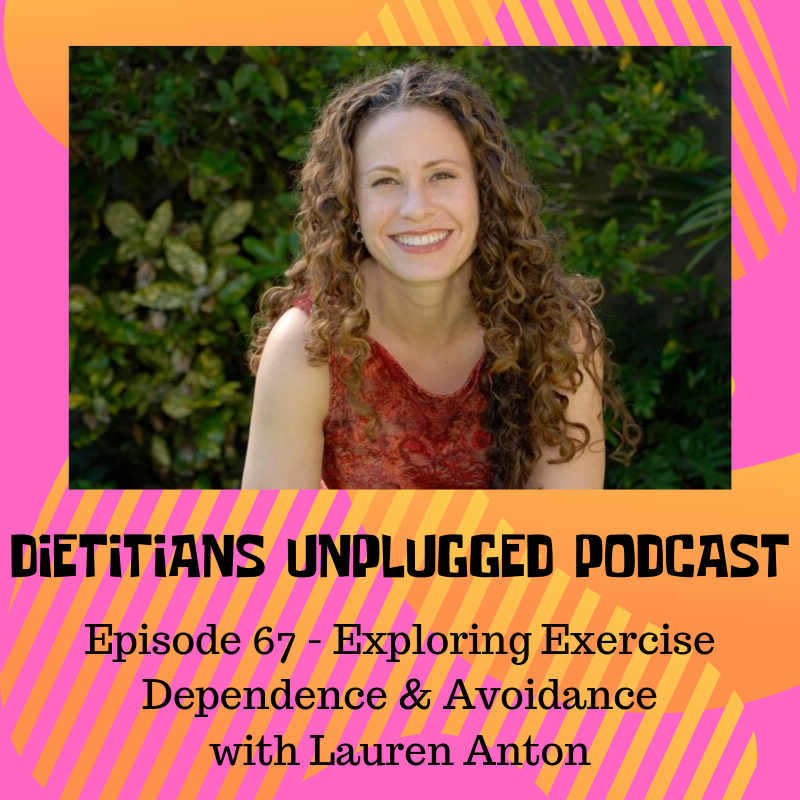
Diet culture and eating disorders can make one’s relationship to exercise complicated.
Allow me to flashback for a moment…
It’s the 1980s, and Jane Fonda has just ruined, oops, I mean revolutionized women’s lives with aerobic exercise. Who could resist those neon-and-pastel body suits, leggings and headbands? Without reading too much into the actual history of it all, this, in my mind, is the moment where exercise became some sort of imperative for being “the right kind of female.”
And me? I hated formal exercise. I was a rough-and-tumble kid who liked to play outside at made-up games, pick-up softball and kick-ball games, and still remember the glorious summer when the oldest kid in our neighborhood would organize block-wide games of hide-and-seek, kick-the-can and ghost-in-the-graveyard (Damn my childhood seems idyllic now). I was good at nothing except being scrappy and determined. Always the slowest, but it didn’t seem to matter when we were at play.
Anyhoo, along came high school and uninspired gym teachers who, on occasion, would play videos of “The 20 Minute Workout“, which, upon remembrance, actually came with a health hazard warning, and truly felt like a cardiac nightmare even for a teenager (or maybe just this teenager??). I mean, what was with all the damn jumping??
And then, later, the years of exercising because I felt I should because that’s what thin people did. Needless to say, that ended up feeling like more of a punishment than anything else and did not endear me to exercise for a lifetime.
Flash forward to the present. It’s been a long, circuitous journey to where I am now. I’ve found what works for me for now. And what works for me might not work for someone else, and that’s okay. No one is obligated to exercise either – it’s not a marker of your worthiness as a human in any way.
So what’s your relationship to movement feel like? Do you feel compelled to exercise even when you don’t want to? Do you struggle to incorporate movement into your life even though you truly want to? If so, you might enjoy this Dietitians Unplugged podcast episode that we did with my good friend, colleague and mentor, Lauren Anton MS, RD, CEDRD-S, CPT. She’s knowledgeable in all things exercise and eating disorders and non-diet sports nutrition. She’s amazing and I think you will find her story interesting and her advice helpful.

Show Notes:
Follow Lauren on Instagram
Listen on:
Subscribe and get my free guide:
Why you overeat …and what to do about it
Click here if you just want my newsletter!
Podcast
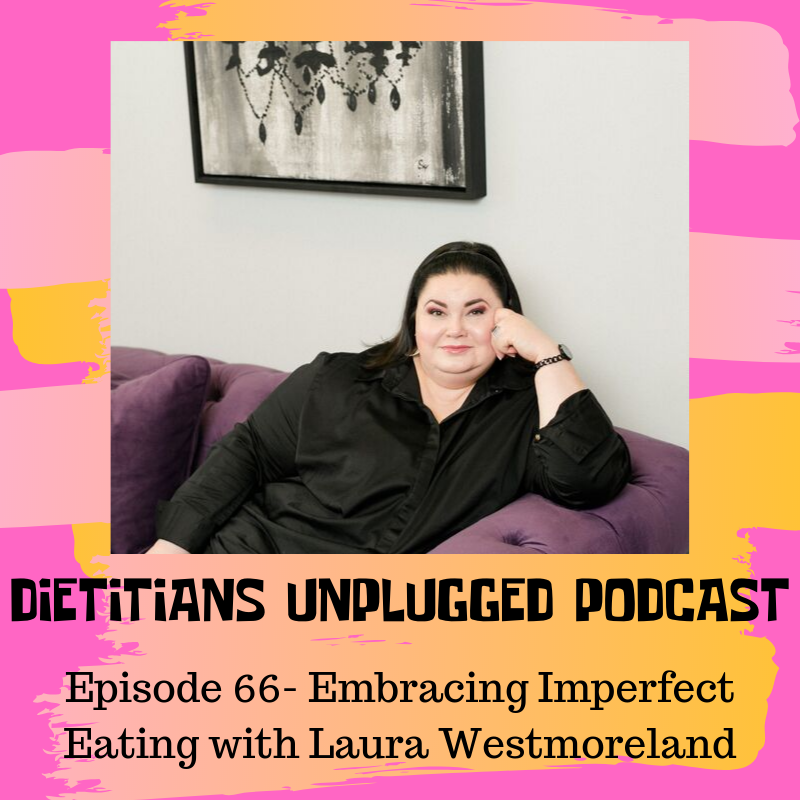
I am a recovering perfectionist.
I don’t know where I learned the idea that I needed to be perfect (not from my parents) but I really embraced this idea sometime in my teens and went whole hog on it by my 20s. I suspect it was a way to relieve anxiety about not being good enough in the world, but it eventually became an anxiety all on its own – and it never propelled me to where I wanted to go.
By the time I reached my late 30s and was back in school full-time, I was putting that perfectionism to use with great study habits and turning out amazing school work, but I was also wasting time, energy and stress because probably 90% of what I was doing didn’t need to be perfect. I have since learned when good enough is acceptable, and when to pull out that perfectionist streak (less often than you think).
I notice that my clients are often perfectionists, too. It’s my belief that anyone who has been on a diet for any amount of time is a perfectionist – even if they feel they “failed” the diet. Diets come with rules that you have to follow perfectly for “success” (except we know that failure is built-in to diets no matter how perfectly you follow them). When we begin to do the messy, ambiguous work of learning to honor body cues and appetite, perfection is not only needed, but it can hinder the process.
I was happy to talk about this subject with my wonderful colleague Laura Westmoreland, LMFT on the Dietitians Unplugged podcast. Laura, who is a certified Body Trust provider, talks about aiming for C level work when we’re learning how to trust our bodies. We don’t need to be perfect as we stumble towards compassionate connection with our bodies and ourselves, and in fact, expecting perfect work can even hold us back.
If you are a perfectionist and feeling anxious about not doing this work of learning to trust and respect your body “right”, then this episode is especially for you.
Show Notes:
Learn more about Laura: https://www.laurawestmoreland.com/
Follow Laura on Instagram
Listen on:
Subscribe and get my free guide:
Why you overeat …and what to do about it
Click here if you just want my newsletter!
Podcast
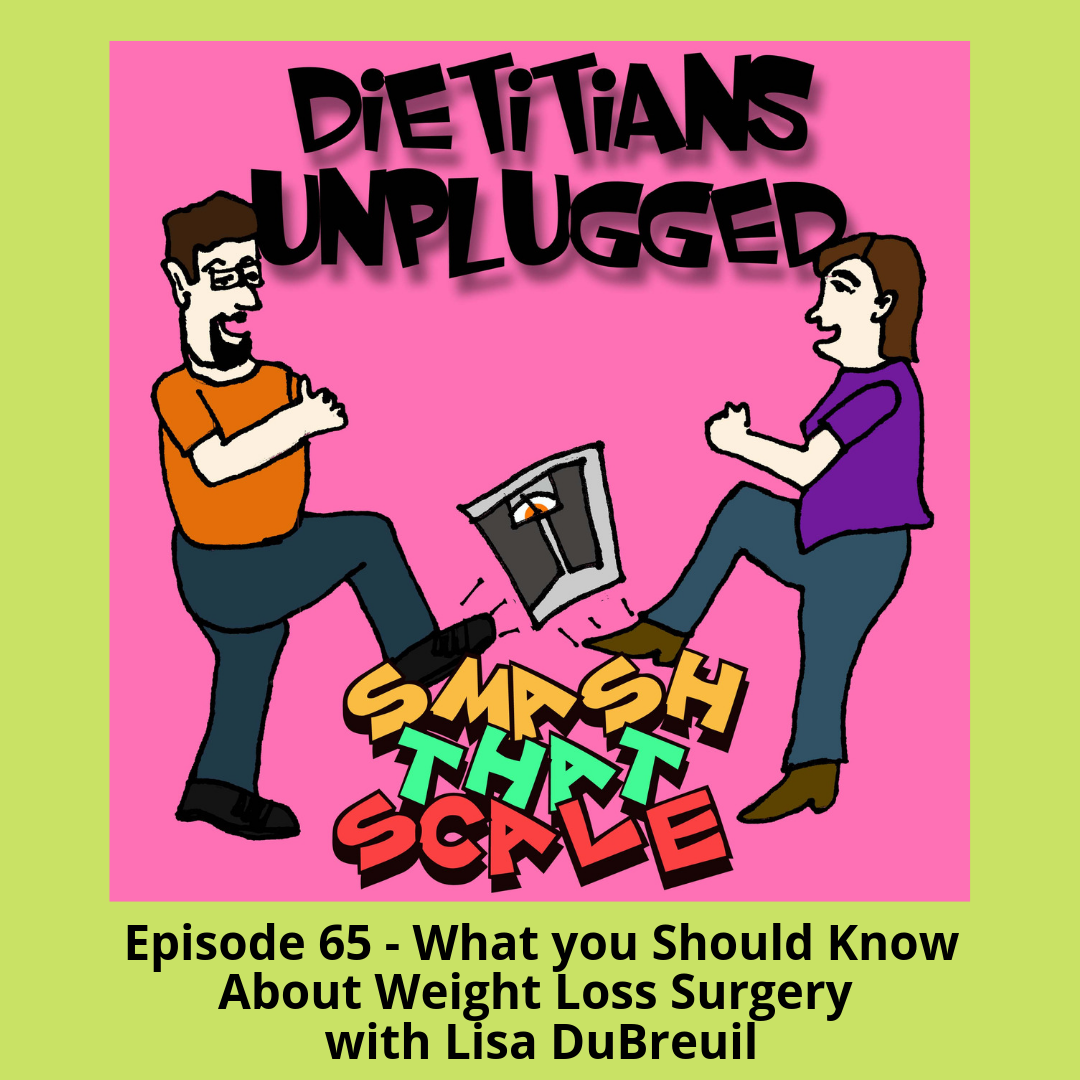
I want to be as transparent as possible about my feelings on this topic, so here goes.
I am not a fan of weight loss surgery.
I was not a fan of it when I first started to know people who were getting it, 20 years ago, even as I was steeped in diet culture. Twenty years later, I do not feel any better about it, based on the (scant) available evidence around the long-term outcomes, and on the personal evidence I have seen in my own life (weight regain, multiple surgeries, pain from surgery, and, sadly, even death). I don’t think the medical community does enough to prepare people for this surgery and the physical and psychological after-effects, and I don’t think it properly addresses possible underlying disordered eating which can continue even after surgery.
So that’s me. But I can’t make anyone’s decision for them. And I won’t judge anyone for choosing this surgery, especially in the fat-phobic culture we live in. What I can do is hold space for this kind of decision-making, and provide important information to help a person make a fully informed decision. (I, of course, prefer the path of radical body acceptance and Health at Every Size, but again, I can’t make that decision for others)
This Dietitians Unplugged podcast episode is part of providing that information. We talked to the wonderful, fierce HAES advocate Lisa DuBreuil, LICSW, who frequently works with clients who are considering or have undergone weight loss surgery. In this episode, we discuss the erroneous idea of “weight loss surgery as panacea”, how the medical community doesn’t do enough to prepare people before making this decision, and the possible medical and psychological consequences of having bariatric surgery.

Lisa’s website
Lisa on Twitter
Listen on:
Libsyn
Apple Podcasts
Stitcher
YouTube
Subscribe and get my free guide:
Why you overeat …and what to do about it
Click here if you just want my newsletter!
Podcast
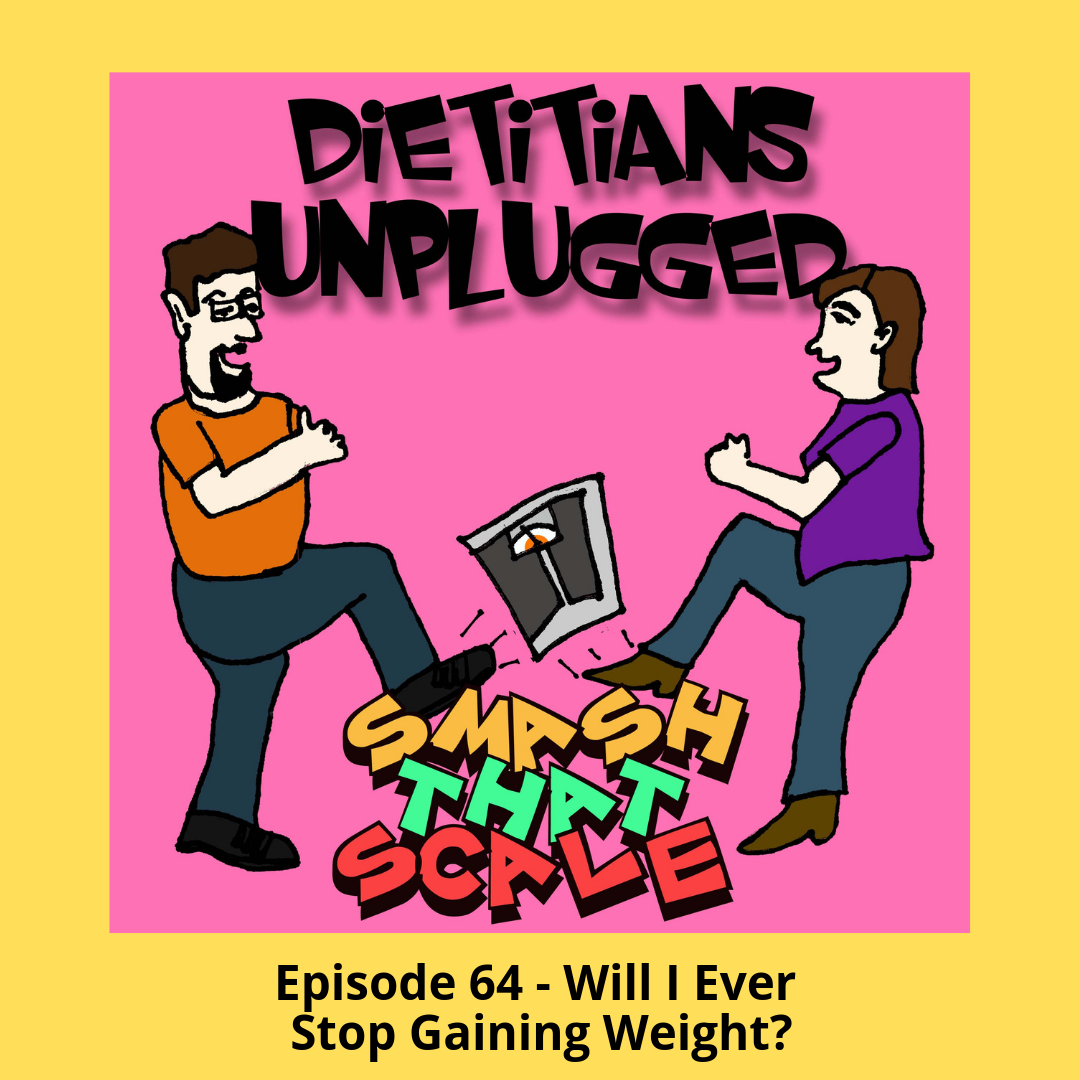
I hear this from my clients a lot: “I’m afraid I’ll never stop gaining weight!” Thanks to societal weight stigma, I understand why anyone would have this fear. Large bodies have long been stigmatized and no one wants to put themselves in the way of stigma.
At the same time, how do we control our weight as we go through the normalization process with food? The answer: we really can’t. After all, wasn’t it trying to control our weight, over and over, that got us in this mess of weight cycling and food struggles in the first place?
And yet – the pain of weight gain is real. We want to be relaxed, happy eaters, but when it comes with weight gain, the whole process can feel confusing and discouraging.
So in this Dietitians Unplugged podcast, Aaron and I talk about that fear, and also about caring for your body as it is now.

Show notes:
Undersummers Slip Shorts https://www.undersummers.com/
Other anti-chafing solutions: https://www.buzzfeed.com/nataliebrown/best-anti-chafing-products-save-your-thighs
Coach Cinder Ernst offers Plus Size Knee Pain Solutions
Listen on:
Libsyn
Apple Podcasts
Stitcher
YouTube
Subscribe and get my free guide:
Why you overeat …and what to do about it
Click here if you just want my newsletter!
Podcast
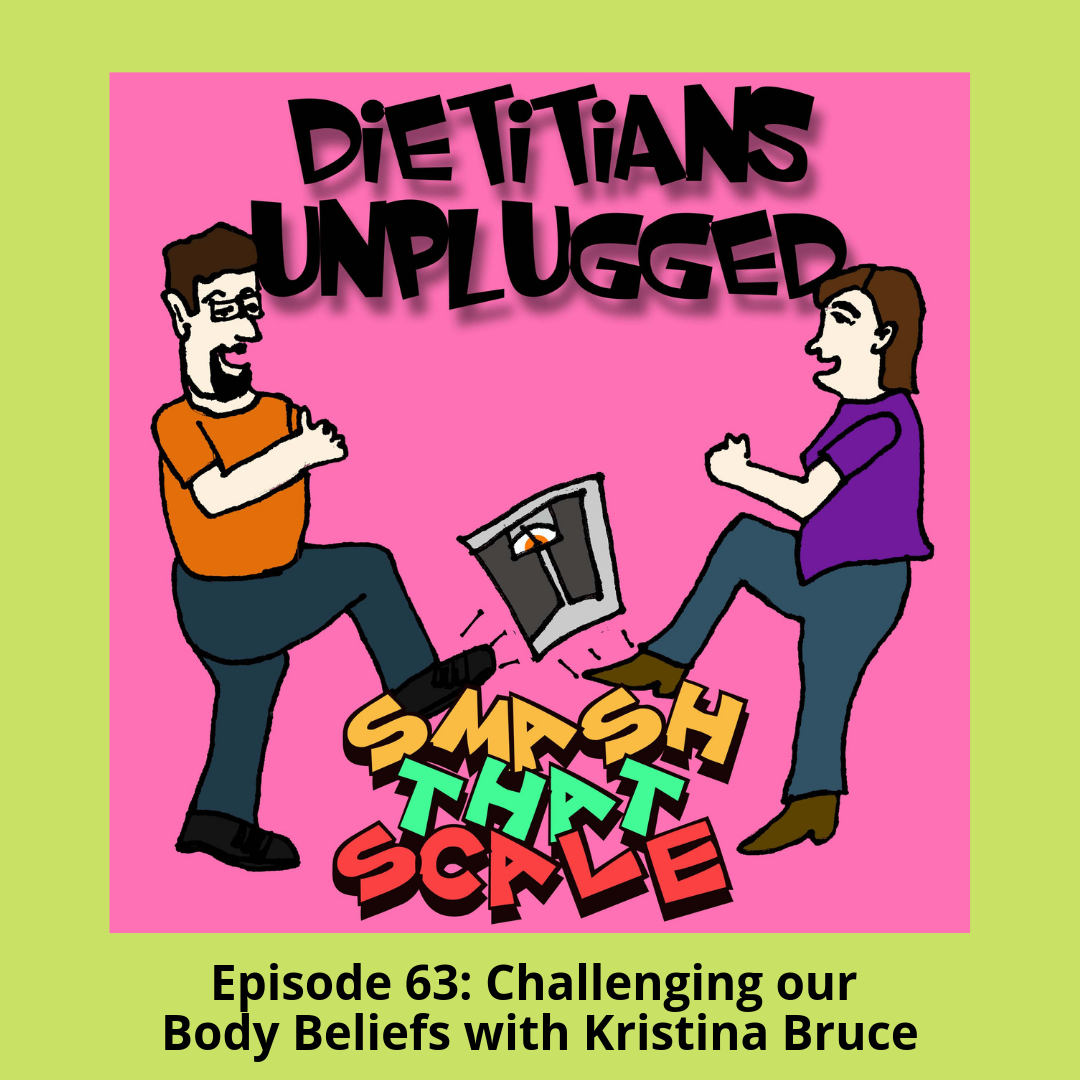
Aaron and I welcomed Kristina Bruce to the Dietitians Unplugged podcast to help our listeners learn to challenge negative, unhelpful beliefs about themselves and their bodies.
Kristina is a certified Integrative Life Coach, Body Acceptance Coach and Certified Body Trust® Provider. She employs Byron Katie’s method, The Work, to help clients question beliefs that cause them stress and to help see those beliefs for what they are — thoughts, not reality. During this interview, we were so grateful to Kristina for sharing an important tool to help do this work and this episode will be pivotal for anyone hoping to get free from the negative beliefs they feel about their body.
Show Notes:
Visit Kristina Bruce at her website
Subscribe and get my free guide:
Why you overeat …and what to do about it
Click here if you just want my newsletter!
Podcast
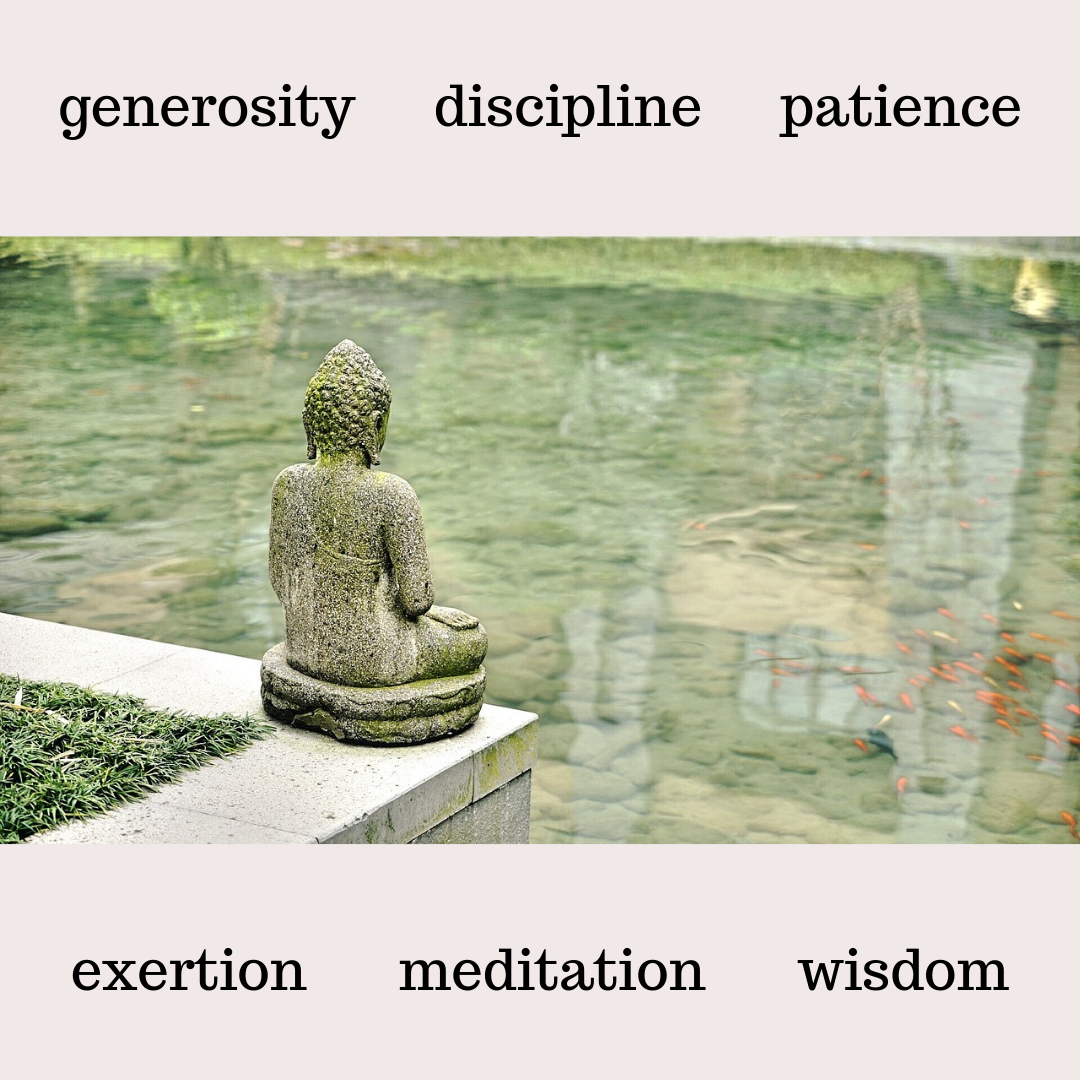
We welcomed Jenna Hollenstein, MS, RDN, CDN, author of the book Eat to Love: A Mindful Guide to Transforming your Relationship with Food, Body, and Life, to the podcast to talk about her framework, which is based in Buddhism, for healing disordered eating.
In this episode, she explains the six Paramitas (generosity, discipline, patience, exertion, meditation and wisdom) and how we can apply them in approaching intuitive eating. Her compassion-based framework asks us to see ourselves as a beloved other in learning how to listen to our inner wisdom and bring about sustainable, positive self-care.
Show Notes:
Find Jenna Hollenstein:
Subscribe and get my free guide:
Why you overeat …and what to do about it
Click here if you just want my newsletter!
Podcast
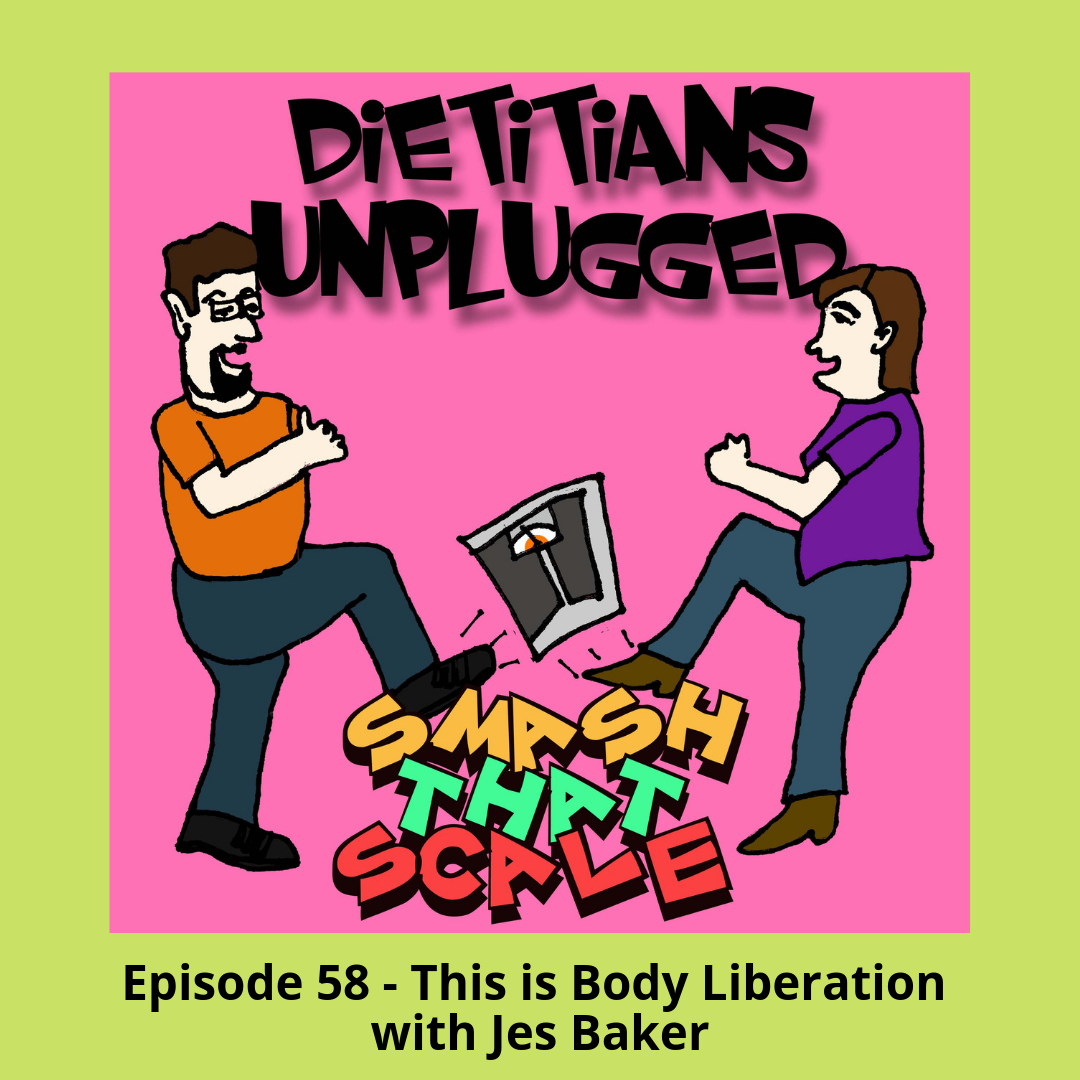
The Dietitians Unplugged podcast was excited and honored to host Jes Baker, aka The Militant Baker, author of the books Landwhale and Things No One Will Tell Fat Girls: A Handbook for Unapologetic Living to talk about what body liberation means and how it can change our lives for the better.
Jes is a positive, progressive, and magnificently irreverent force to be reckoned with in the realm of self-love advocacy and mental health. She is internationally known for preaching the importance of body liberation, hard conversations, strong coffee, and even stronger language. Jes burst onto the body image scene when she created her own ads mocking Abercrombie & Fitch for discriminating against all body types – a move that landed her on the Today Show and garnered a loyal following for her raw, honest, and attitude-filled blog missives.
In this fantastic episode, she tells us about her revelation that she hadn’t been a fat child, turning insults into cool nicknames, and how talking about mental health can be healing.
Show notes:
Learn more about Jes Baker
Read Jes’ writing at The Militant Baker
Check out Jes’ books Landwhale and Things No One Will Tell Fat Girls
Subscribe and get my free guide:
Why you overeat …and what to do about it.
Click here if you just want my newsletter!
Podcast
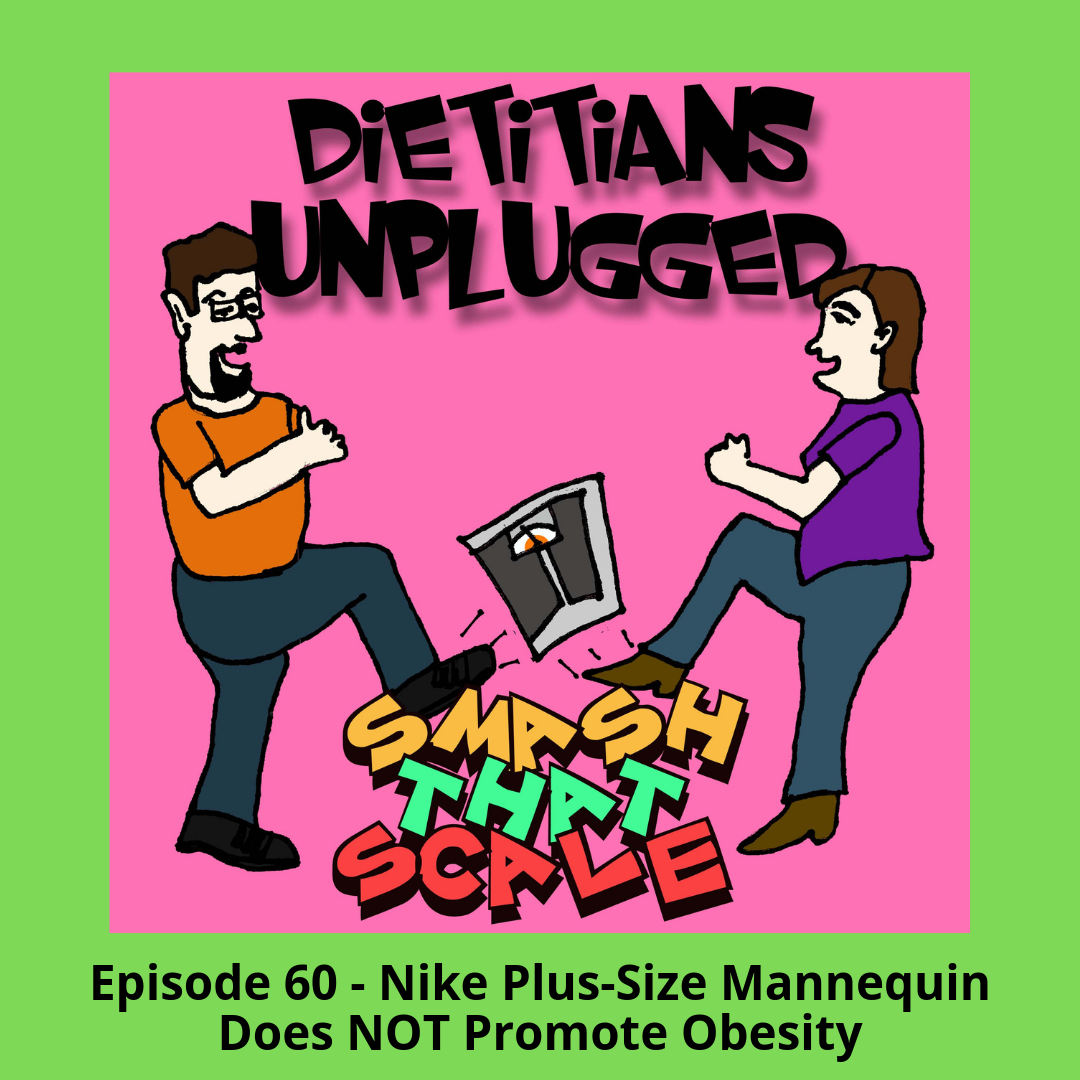
Nike recently unveiled a new plus-size line of athletic clothing and with it, a plus-size mannequin on which to display the clothing. Makes sense, right? A plus-size mannequin to display plus-size clothing.
One journalist, however, railed against this move as “promoting obesity.” In this Dietitians Unplugged episode, Aaron and I talk about the reaction to the mannequin, both good and bad, how promoting obesity is not actually “a thing”, and the role that internalized weight stigma may have played in this reaction.
Show notes:
I’m not linking to the original article because it’s pretty mean, and you can search the Tanya Gold/Nike article if you want to read it (it’s pretty easy to find). Instead, here are some great articles clapping back.
Telegraph’s Fatphobic Take On Nike’s Plus-Size Mannequins Receives Backlash
The Real Issue With Nike’s Plus Size Mannequins
Dances with Fat: Nike’s Plus Size Mannequins Uncover the Truth About Weight Stigma
Study showing lower mortality in “overweight” category (referenced)
Subscribe and get my free guide:
Why you overeat …and what to do about it
Click here if you just want my newsletter!
Podcast

In this episode of the Dietitians Unplugged podcast, we were thrilled to talk to Dr. Jennifer Gaudiani of the Gaudiani Clinic in Denver, CO which provides in-person and telehealth care to people with current or a history of eating disorders.
Dr. G is the author of the book Sick Enough, a Guide to the Medical Complications of Eating Disorders. She talked to us about her journey to becoming a non-diet aligned doctor, and how she realized that this is the only ethical way to treat patients, especially those in larger bodies. She explains her “house on fire” analogy which helps those who struggle to understand that they are already sick enough with their eating disorder and don’t need to delay treatment any longer. We think everyone will benefit from listening to this podcast – patients and doctors alike.
Show notes:
Sick Enough, a Guide to the Medical Complications of Eating Disorders
Subscribe and get my free guide:
Why you overeat …and what to do about it
Click here if you just want my newsletter!